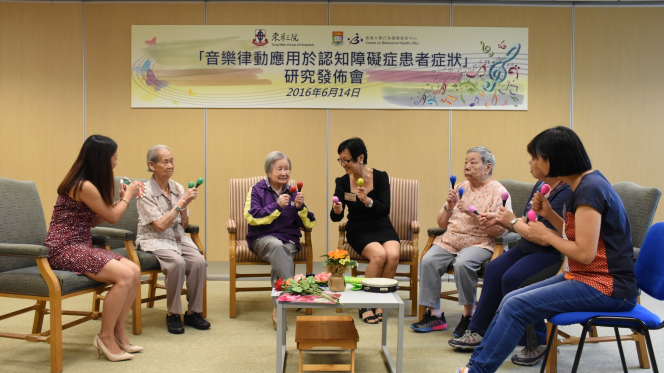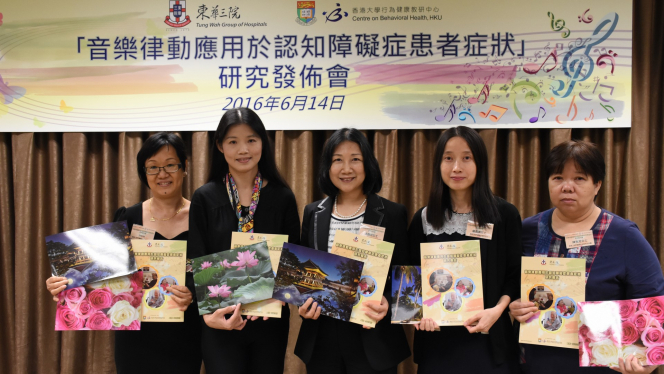Media
HKU Centre on Behavioral Health study reveals effectiveness of music intervention using local songs in managing agitation among elderly with Dementia
14 Jun 2016
The Elderly Services Section of Tung Wah Group of Hospitals (TWGHs) invited the Centre on Behavioral Health (CBH) of the University of Hong Kong to conduct a study from October 2014 to September 2015 on music and movement intervention on elders with dementia and its effectiveness in improving their behavioral and psychological symptoms. The project was supported by the Social Welfare Department’s Social Welfare Development Fund (Phase 2). The organising committee held a press conference at the centre today (June 14) to introduce the project and disseminate research findings.
Ms. Alice Leung, Assistant Community Services Secretary (Elderly Services) of the TWGHs, referred to the rapid increase in the number of people with dementia in Hong Kong and the increasing demand for non-medical alternative treatments to help with the communication difficulties, and emotional and behavioral problems developed as the disease progresses. Ms Leung said TWGHs has been proactive in developing different enrichment programmes for elderly with dementia. The group commissioned expressive arts therapists at CBH to design an art based program specific to the culture of Hong Kong for people with dementia and the findings have been inspiring. After taking part in the programme, elderly patients show significant improvement in their emotional and behavioral problems. Their family members are satisfied with the changes. Ms. Leung emphasised the need to provide greater support to caregivers of elderly with dementia and to explore different types of interventions for dementia patients in Hong Kong to enhance their quality of life.
At the press conference, the organiser introduced a set of music-based activity tool cards and 10 suggested activities for elderly parents with dementia. The materials will be distributed to caregivers of elderly with dementia at TWGHs elderly centres.
Despite a great number of music and art-related intervention courses now available, the current programme has been the first of its kind tailor-made for elderly with dementia in Hong Kong. Dr. Rainbow Ho, CBH Director and Associate Professor of the HKU Department of Social Work and Social Administration, said elderly (aged 65 to 80) in TWGHs residential homes were surveyed when designing the activities. They were asked of their favorite songs and their activity levels recorded. The intervention was designed by a team comprising experienced music therapist, dance-movement therapist, expressive arts therapist and art psychotherapist. Depending on the activity level, local music is integrated with simple motor movement to provide multiple stimulations including sensory, emotion, imagery and memory to elderly with dementia, to improve their mood and agitation.
A total number of 72 elderly with dementia from 10 TWGHs residential homes participated in the research. They were divided into experimental and control groups. In the experimental group, the elders participated in an 8-week intervention, two sessions per week and each session lasted for 30 minutes, led by an Expressive Arts Therapy Trainee from HKU and a social worker from TWGHs. In the control group, the elders received care as usual. TWGHs staff recorded the behavioral and psychological symptoms of the elderly before, in the middle and at the end of the intervention. Research findings revealed improvements in agitated behaviors, aberrant motor behaviors, irritability, dysphoria and subjective mood among elders in the experimental group. Improvements in their agitated behaviors, dysphoria and subjective mood reached a statistically significant level. Improvement rates ranged from 14.4 to 57.1%.
Ms. Chan, whose mother suffers from dementia and lives in a TWGHs residential home, shared her experience at the press conference. She was frustrated with her mother’s fluctuated mood and frequent calls to her. After participating in the music and movement intervention, her mother is now happier and a volunteer at the residential home to help others in need. Ms. Chan is excited about the changes.
Dr. Ho said the research results have confirmed the effectiveness of the use of non-pharmacological treatment for elders with dementia, in particular the use of arts as a medium of intervention for improvement of behavioral and psychological symptoms. This form of intervention is worth promoting, since it is safe and elders in general enjoy the process. Dr. Ho hopes the government and social welfare agencies could devote more resources for future expressive arts related research and hiring more people to provide services to benefit more elderly in need.
For details about the research findings, please contact:
Ms. Janet Kwok,
Project Manager (Dementia Care), Elderly Services Section, Community Services Division, Tung Wah Group of Hospitals (Tel: 2865 7810/ email: janet.kwok@tungwah.org.hk)
Ms. Amy Choi,
Senior Executive Assistant, Centre on Behavioral Health, HKU (Tel: 2831 5163/ email: amychoi@hku.hk)
Ms. Joyce Sing,
Research Executive, Centre on Behavioral Health, HKU (Tel: 2831 5216/ email: singcy@hku.hk).


